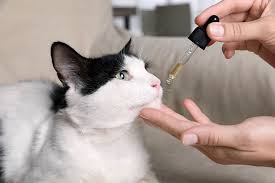Introduction:
Rick Simpson Oil for Cats, In recent years, pet owners have been increasingly turning to alternative therapies to alleviate their furry companions’ ailments. One such alternative gaining traction is Rick Simpson Oil (RSO), known for its purported health benefits in humans. But what about its potential for our feline friends? In this comprehensive guide, we delve into the world of Rick Simpson Oil for cats, exploring its uses, benefits, and considerations for pet owners.
Understanding Rick Simpson Oil:
Rick Simpson Oil, named after its creator Rick Simpson, is a cannabis extract renowned for its high concentration of cannabinoids, particularly tetrahydrocannabinol (THC) and cannabidiol (CBD). It is primarily produced through the extraction of cannabis using solvents like ethanol, resulting in a potent, thick oil.
Potential Benefits for Cats:
While research on the effects of RSO specifically on cats is limited, anecdotal evidence suggests that it may offer several potential benefits for feline companions:
- Pain Management: Like in humans, cannabinoids in RSO may help alleviate pain and discomfort in cats, especially those suffering from chronic conditions like arthritis or cancer.
- Anxiety Reduction: Cats can experience anxiety due to various factors, such as separation anxiety or changes in their environment. CBD, a prominent component of RSO, has been shown to have calming effects, which could benefit anxious cats.
- Appetite Stimulation: Loss of appetite is a common issue in sick or elderly cats. THC, another component of RSO, is known to stimulate appetite, potentially aiding in the management of this problem.
- Anti-inflammatory Properties: Inflammation is a contributing factor to many feline health issues. CBD has demonstrated anti-inflammatory properties, which could help alleviate inflammation-related symptoms in cats.
Considerations for Pet Owners:
Before incorporating RSO into your cat’s wellness regimen, it’s essential to consider the following:
- Dosage: Determining the appropriate dosage of RSO for cats can be challenging due to variations in their size, weight, and individual response to cannabinoids. Start with a low dose and gradually increase it while closely monitoring your cat’s behavior and symptoms.
- Quality and Purity: Ensure that the RSO you purchase is of high quality and free from contaminants. Look for products that have been tested by third-party laboratories for potency and purity.
- Consultation with a Veterinarian: Before administering RSO to your cat, consult with a veterinarian knowledgeable about cannabis-based therapies for pets. They can provide guidance tailored to your cat’s specific needs and health conditions.
- Legal Considerations: The legality of cannabis and cannabis-derived products varies by region. Familiarize yourself with the laws and regulations regarding the use of RSO for pets in your area.
Conclusion:
While the potential benefits of Rick Simpson Oil for cats are promising, further research is needed to fully understand its efficacy and safety in feline companions. Pet owners considering RSO as a therapeutic option for their cats should approach it with caution, seeking guidance from veterinarians and ensuring responsible use. With proper care and consideration, RSO may offer relief and improve the quality of life for cats facing various health challenges.
You Might Also Like These:
Rick Simpson Oil for PTSD: A Promising Alternative Therapy
Understanding Rick Simpson Oil for Migraines: A Natural Remedy
Understanding Rick Simpson Oil for Arthritis Relief
Exploring the Benefits of Rick Simpson Oil for Dogs: A Comprehensive Guide
Exploring the Potential of Rick Simpson Oil for Cats: A Comprehensive Guide

